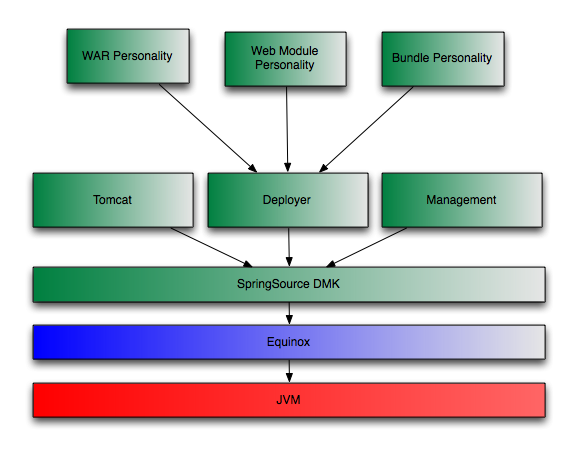The SpringSource dm Server, or dm Server for short, is the runtime portion of the SpringSource Application Platform. It is a lightweight, modular, OSGi-based runtime that provides a complete packaged solution for developing, deploying, and managing enterprise applications. By leveraging several best-of-breed technologies and improving upon them, the dm Server offers a compelling solution to develop and deploy enterprise applications.
The SpringSource dm Server is built on top of the following core technologies:
- Spring Framework, obviously!
- Tomcat as the web container.
- OSGi R4.1.
- Equinox as the OSGi implementation.
- Spring Dynamic Modules for OSGi for working with OSGi in a Spring application.
- SpringSource Tool Suite for developing applications.
- Spring Application Management Suite for monitoring the SpringSource dm Server and the applications that have been deployed to it.
Note, however, that the SpringSource dm Server isn't just a combination of these technologies. Rather, it integrates and extends these technologies to provide many features essential for developing, deploying, and managing today's enterprise Java applications.
The following diagram presents a high-level overview of the dm Server's architecture.

At the heart of the SpringSource dm Server is the SpringSource Dynamic Module Kernel (DMK). The DMK is an OSGi-based kernel that takes full advantage of the modularity and versioning of the OSGi platform. The DMK builds on Equinox and extends its capabilities for provisioning and library management, as well as providing core functionality for the dm Server.
To maintain a minimal runtime footprint, OSGi bundles are installed on demand by the DMK provisioning subsystem. This allows for an application to be installed into a running dm Server and for its dependencies to be satisfied from an external repository. Not only does this remove the need to manually install all your application dependencies, which would be tedious, but it also keeps memory usage to a minimum.
As shown in the figure, SpringSource DMK runs on top of Equinox within a standard Java Virtual Machine. Above the DMK is a layer of subsystems which contribute functionality to the dm Server. Subsystems are configured to run for various profiles and typically provide additional services to the basic OSGi container such as serviceability, management, and personality-specific deployment.
In the SpringSource dm Server, applications are modular and each module has a personality that describes what kind of module it is: web, batch, web service, etc. The dm Server deploys modules of each personality in a personality-specific manner. For example, web modules are configured in Tomcat with web context. Each module in the application can be updated independently of the other modules whilst retaining the identity of being part of the larger application. Whatever kind of application you are building, the programming model remains standard Spring and Spring DM.
Version 2.0.0.M4 of the SpringSource dm Server supports the bundle, web, and WAR personalities, which enable you to build sophisticated web applications. The WAR personality includes support for standard Java EE WARs, "shared library" WARs, and "shared services" WARs, each of which will be covered in greater detail in Chapter 3, Deployment Architecture. Future releases will include support for more personalities such as batch, web services, etc.